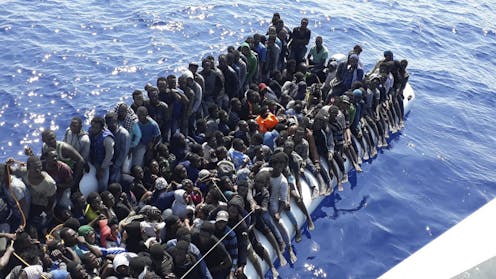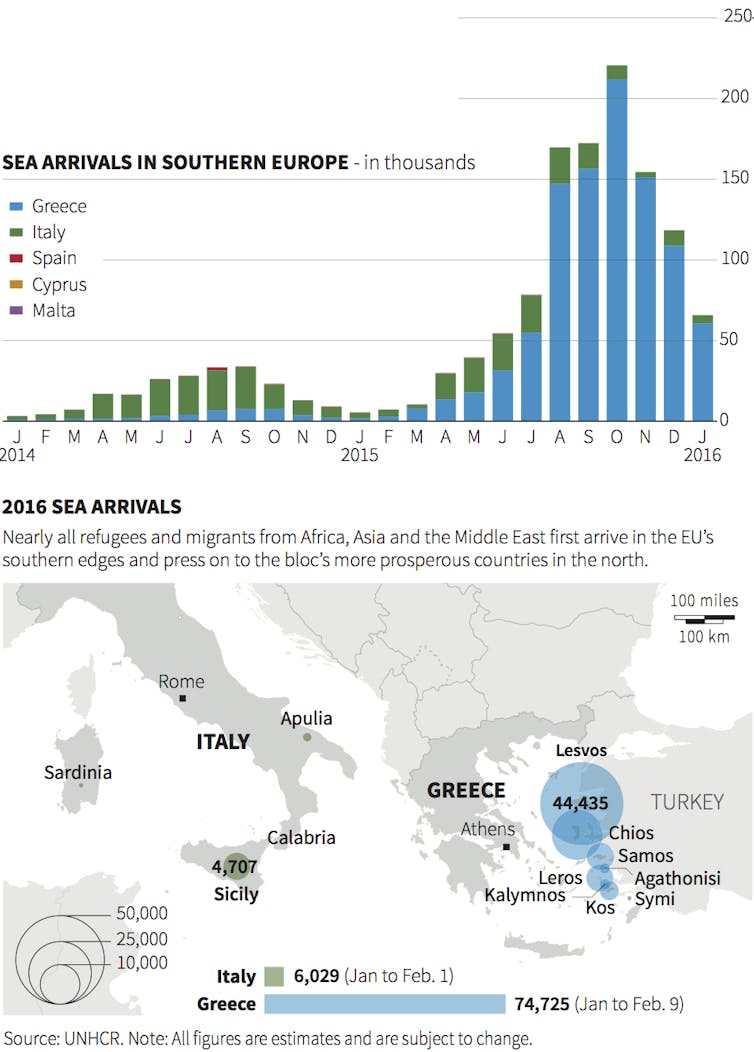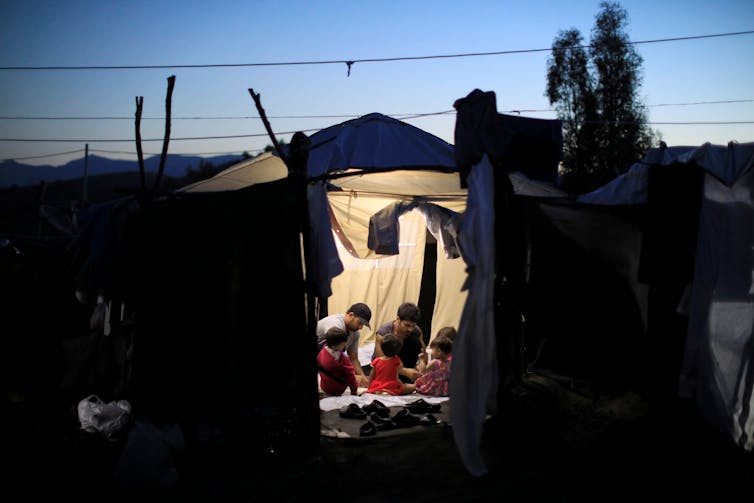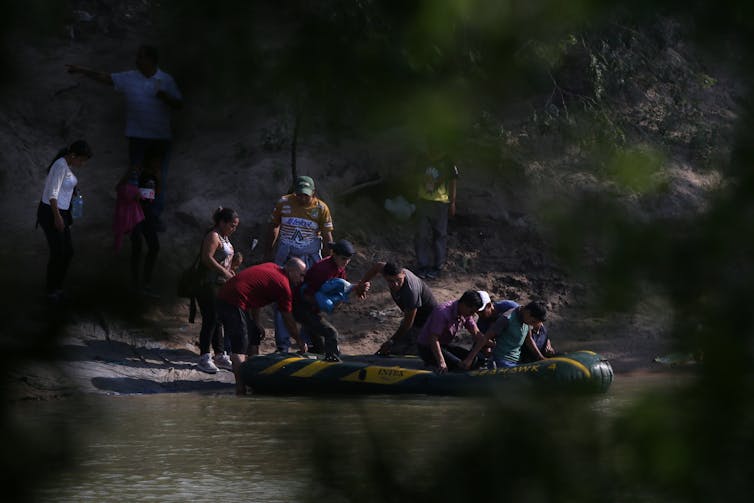Europe's refugee crisis explains why border walls don't stop migration
- Written by Eleanor Paynter, PhD Candidate, Comparative Studies, The Ohio State University

President Trump has long called migration a security crisis[1], but in recent weeks he has also referred to the situation along the southern border as a humanitarian crisis[2].
As he ended the government shutdown in a televised speech on Jan. 25, Trump reiterated his claim[3] that a border wall between the United States and Mexico would save the lives of Central American migrants, many of whom are women and children.
“Walls work,” he said[4]. “They save good people from attempting a very dangerous journey from other countries.”
As my doctoral research[5] into Europe’s 2015-2016 refugee crisis[6] shows, however, stricter border control doesn’t stop migration. Often, it makes it more dangerous.
Open arms or closed borders?
An estimated 1.3 million migrants[7] entered the European Union in 2015 — more than double the year before. They were seeking asylum protection from war, conflict and extreme poverty.
To put that figure in context, just half-a-million migrants[8] — including asylum-seekers, who typically give themselves up to border agents — were apprehended at the U.S.-Mexico border in 2018.
Most of Europe’s migrants came from Syria, Afghanistan or Iraq. Generally, these asylum-seekers entered the European Union via Turkey, crossing Macedonia, Serbia and other Balkan countries[9] by foot.
Well over 100,000 migrants from sub-Saharan African countries[10] reached southern Europe by sea in 2015, crossing the Mediterranean from North Africa.
Overwhelmed with these increased arrivals, national governments in Europe took dramatically different approaches to managing their borders.
Germany threw its doors open[11]. Almost 900,000 migrants[12] arrived there in 2015 after the country suspended an EU rule[13] requiring that migrants apply for asylum in the first EU country they set foot in.
Migrants arriving at southern nations like Greece and Italy generally hoped[14] to continue north[15] to Germany.
Greece, however, was unable to process the more than 850,000 migrants[16] who arrived to its shores in 2015. It built holding camps on its Aegean islands, where people stayed in overcrowded, often inhospitable conditions[17] for up to two years[18] as their asylum claims[19] were processed.
 Reuters Graphics[20] Other EU governments were openly hostile to refugees. Across Eastern Europe, countries along the Balkan route began to build and extend border barriers. Europe had five border walls in 2014, built following the 1985 Schengen Agreement SchengenVisaInfo.com amid concerns about immigration at the bloc’s external borders. By 2017, it had 15 barriers[22], according to the not-for-profit Transnational Institute, and a heavily patrolled[23] maritime border. Hungary, perhaps the EU’s least immigrant-friendly country, built a high-tech fence[24] that uses thermal detection and cameras to monitor movement, with speakers that blare warnings in five languages. Walls make migration more dangerous Border walls have not stopped migration into Europe. Tens of thousands of migrants still cross the Balkans[25] to reach the EU each year – they just do so in more dangerous[26] conditions. Before the walls, migrants traveled in groups, with or without the help of smugglers. Now, paying a smuggler is the only way for migrants to avoid border guards and pass barriers[27]. For several thousand dollars, smugglers bribe EU border agents, hide migrants in trucks[28] or walk them across EU borders under cover of darkness[29]. Europe’s refugee crisis[30] has now become a housing crisis[31]. At least 10,000 migrants now live in homeless encampments or squats[32] across Italy. And after the French refugee camp known as “The Calais Jungle[33]” was demolished in 2016, nearly as many people scattered to makeshift camps or the streets of French cities[34].
Reuters Graphics[20] Other EU governments were openly hostile to refugees. Across Eastern Europe, countries along the Balkan route began to build and extend border barriers. Europe had five border walls in 2014, built following the 1985 Schengen Agreement SchengenVisaInfo.com amid concerns about immigration at the bloc’s external borders. By 2017, it had 15 barriers[22], according to the not-for-profit Transnational Institute, and a heavily patrolled[23] maritime border. Hungary, perhaps the EU’s least immigrant-friendly country, built a high-tech fence[24] that uses thermal detection and cameras to monitor movement, with speakers that blare warnings in five languages. Walls make migration more dangerous Border walls have not stopped migration into Europe. Tens of thousands of migrants still cross the Balkans[25] to reach the EU each year – they just do so in more dangerous[26] conditions. Before the walls, migrants traveled in groups, with or without the help of smugglers. Now, paying a smuggler is the only way for migrants to avoid border guards and pass barriers[27]. For several thousand dollars, smugglers bribe EU border agents, hide migrants in trucks[28] or walk them across EU borders under cover of darkness[29]. Europe’s refugee crisis[30] has now become a housing crisis[31]. At least 10,000 migrants now live in homeless encampments or squats[32] across Italy. And after the French refugee camp known as “The Calais Jungle[33]” was demolished in 2016, nearly as many people scattered to makeshift camps or the streets of French cities[34].  Asylum-seekers may stay at refugee camps for years while their claims are processed. Reuters/Giorgos Moutafis[35] Stopping migrants before they arrive Italy, where most refugees arrive by boat from North Africa, has tried to keep migrants out in a different way: It outsources its border security. In 2017, Italy struck[36] a deal to supply the Libyan coast guard with vessels and anti-smuggling training. The agreement promised US$325 million[37] if Libyan agents would intercept migrants crossing the Mediterranean and return them to Libyan detention centers. Human rights organizations have questioned[38] the deal, citing[39] Libya’s political unrest and documented history of migrant enslavement and torture[40]. Returning migrants to detention centers in Libya may also violate international law[41], since refugees cannot be kept safe there[42]. In my own interviews with African migrants in Italy who’d crossed the Sahara to Libya, many told me that they eventually boarded a boat there not as a final step toward Europe, but to escape imprisonment or torture in Libya. Libyan coast guard boats have left many migrants stranded[43] at sea. In September 2018, when a boat carrying 100 migrants capsized, Italy and Libya blamed one other[44] for the failed rescue. Libya’s deterrence mission conflicts with the rescue operations of aid boats that bring migrants to Europe. Italy says rescues invite more migration, despite research[45] disproving this claim[46]. Last June, 629 migrants[47], including 123 unaccompanied minors and seven pregnant women, were held at sea for over a week, unable to seek asylum or aid. Malta, Spain and France have since repeatedly closed their ports[48] to rescue vessels, refusing to bear responsibility for the migrants on board. Lessons for the US Irregular migration to Europe did decrease last year, primarily because fewer Syrians are fleeing[49] their war-torn country. More migrants – nearly 700,000 people[50] – are also being detained in Libya. Migrant routes into the EU also continue to shift in response to closing borders. Spain, for example, has seen sea arrivals increase tenfold since 2015[51]. In my assessment, Trump’s crackdown along the U.S.-Mexico border will have similar results. There are signs of this already.
Asylum-seekers may stay at refugee camps for years while their claims are processed. Reuters/Giorgos Moutafis[35] Stopping migrants before they arrive Italy, where most refugees arrive by boat from North Africa, has tried to keep migrants out in a different way: It outsources its border security. In 2017, Italy struck[36] a deal to supply the Libyan coast guard with vessels and anti-smuggling training. The agreement promised US$325 million[37] if Libyan agents would intercept migrants crossing the Mediterranean and return them to Libyan detention centers. Human rights organizations have questioned[38] the deal, citing[39] Libya’s political unrest and documented history of migrant enslavement and torture[40]. Returning migrants to detention centers in Libya may also violate international law[41], since refugees cannot be kept safe there[42]. In my own interviews with African migrants in Italy who’d crossed the Sahara to Libya, many told me that they eventually boarded a boat there not as a final step toward Europe, but to escape imprisonment or torture in Libya. Libyan coast guard boats have left many migrants stranded[43] at sea. In September 2018, when a boat carrying 100 migrants capsized, Italy and Libya blamed one other[44] for the failed rescue. Libya’s deterrence mission conflicts with the rescue operations of aid boats that bring migrants to Europe. Italy says rescues invite more migration, despite research[45] disproving this claim[46]. Last June, 629 migrants[47], including 123 unaccompanied minors and seven pregnant women, were held at sea for over a week, unable to seek asylum or aid. Malta, Spain and France have since repeatedly closed their ports[48] to rescue vessels, refusing to bear responsibility for the migrants on board. Lessons for the US Irregular migration to Europe did decrease last year, primarily because fewer Syrians are fleeing[49] their war-torn country. More migrants – nearly 700,000 people[50] – are also being detained in Libya. Migrant routes into the EU also continue to shift in response to closing borders. Spain, for example, has seen sea arrivals increase tenfold since 2015[51]. In my assessment, Trump’s crackdown along the U.S.-Mexico border will have similar results. There are signs of this already.  More migrants are now turning to smugglers to cross the US-Mexico border. Reuters/Loren Elliott[52] A decades-old U.S. policy of paying Mexico[53] to secure its southern border with Guatemala to keep Central American migrants out has merely made the journey riskier[54], according to a 2018 United Nations report. To avoid apprehension by Mexican border patrol, some migrants get from Guatemala to Mexico by water, on boats[55] that are often operated by traffickers. As in Europe, migrants now increasingly rely on smugglers to get across the U.S.-Mexico border, who may charge more than $10,000[56] per family. That does not guarantee safe passage. Between August and October last year, smugglers abandoned more than 1,400 migrants[57], including children, in the sweltering Arizona desert. Hoping to find safety in large groups[58], more migrants are now traveling in caravans[59]. As the U.S. and the EU struggle to resolve their border crises, migrants will continue to flee[60] their home countries seeking protection. Heightened border control certainly won’t make them safer.
More migrants are now turning to smugglers to cross the US-Mexico border. Reuters/Loren Elliott[52] A decades-old U.S. policy of paying Mexico[53] to secure its southern border with Guatemala to keep Central American migrants out has merely made the journey riskier[54], according to a 2018 United Nations report. To avoid apprehension by Mexican border patrol, some migrants get from Guatemala to Mexico by water, on boats[55] that are often operated by traffickers. As in Europe, migrants now increasingly rely on smugglers to get across the U.S.-Mexico border, who may charge more than $10,000[56] per family. That does not guarantee safe passage. Between August and October last year, smugglers abandoned more than 1,400 migrants[57], including children, in the sweltering Arizona desert. Hoping to find safety in large groups[58], more migrants are now traveling in caravans[59]. As the U.S. and the EU struggle to resolve their border crises, migrants will continue to flee[60] their home countries seeking protection. Heightened border control certainly won’t make them safer. References
- ^ security crisis (www.politico.com)
- ^ humanitarian crisis (time.com)
- ^ claim (www.cnn.com)
- ^ said (www.cnn.com)
- ^ doctoral research (scholar.google.com)
- ^ refugee crisis (journals.sagepub.com)
- ^ 1.3 million migrants (www.pewglobal.org)
- ^ half-a-million migrants (www.pewresearch.org)
- ^ Balkan countries (reliefweb.int)
- ^ sub-Saharan African countries (www.pewglobal.org)
- ^ threw its doors open (www.bbc.com)
- ^ 900,000 migrants (www.reuters.com)
- ^ suspended an EU rule (www.dw.com)
- ^ hoped (www.migrationpolicycentre.eu)
- ^ continue north (www.migrationpolicy.org)
- ^ more than 850,000 migrants (data2.unhcr.org)
- ^ overcrowded, often inhospitable conditions (www.refworld.org)
- ^ two years (www.aljazeera.com)
- ^ asylum claims (www.asylumineurope.org)
- ^ Reuters Graphics (pictures.reuters.com)
- ^ 15 barriers (www.tni.org)
- ^ patrolled (ec.europa.eu)
- ^ high-tech fence (www.dw.com)
- ^ still cross the Balkans (www.theguardian.com)
- ^ more dangerous (www.msf.org)
- ^ avoid border guards and pass barriers (www.dw.com)
- ^ hide migrants in trucks (www.infomigrants.net)
- ^ under cover of darkness (www.law.ox.ac.uk)
- ^ refugee crisis (www.tandfonline.com)
- ^ housing crisis (brill.com)
- ^ homeless encampments or squats (www.msf.fr)
- ^ The Calais Jungle (www.tandfonline.com)
- ^ the streets of French cities (www.theguardian.com)
- ^ Reuters/Giorgos Moutafis (pictures.reuters.com)
- ^ struck (www.repubblica.it)
- ^ US$325 million (euobserver.com)
- ^ questioned (www.dw.com)
- ^ citing (www.nytimes.com)
- ^ migrant enslavement and torture (www.cnn.com)
- ^ violate international law (www.reuters.com)
- ^ cannot be kept safe there (www.theguardian.com)
- ^ stranded (www.nytimes.com)
- ^ blamed one other (www.nytimes.com)
- ^ research (theconversation.com)
- ^ disproving this claim (blamingtherescuers.org)
- ^ 629 migrants (www.aljazeera.com)
- ^ closed their ports (www.france24.com)
- ^ fewer Syrians are fleeing (www.migrationpolicy.org)
- ^ nearly 700,000 people (www.globaldtm.info)
- ^ sea arrivals increase tenfold since 2015 (data2.unhcr.org)
- ^ Reuters/Loren Elliott (pictures.reuters.com)
- ^ paying Mexico (muse.jhu.edu)
- ^ the journey riskier (reliefweb.int)
- ^ on boats (www.theguardian.com)
- ^ more than $10,000 (www.nytimes.com)
- ^ abandoned more than 1,400 migrants (www.theguardian.com)
- ^ large groups (theconversation.com)
- ^ traveling in caravans (theconversation.com)
- ^ will continue to flee (doi.org)
Authors: Eleanor Paynter, PhD Candidate, Comparative Studies, The Ohio State University

